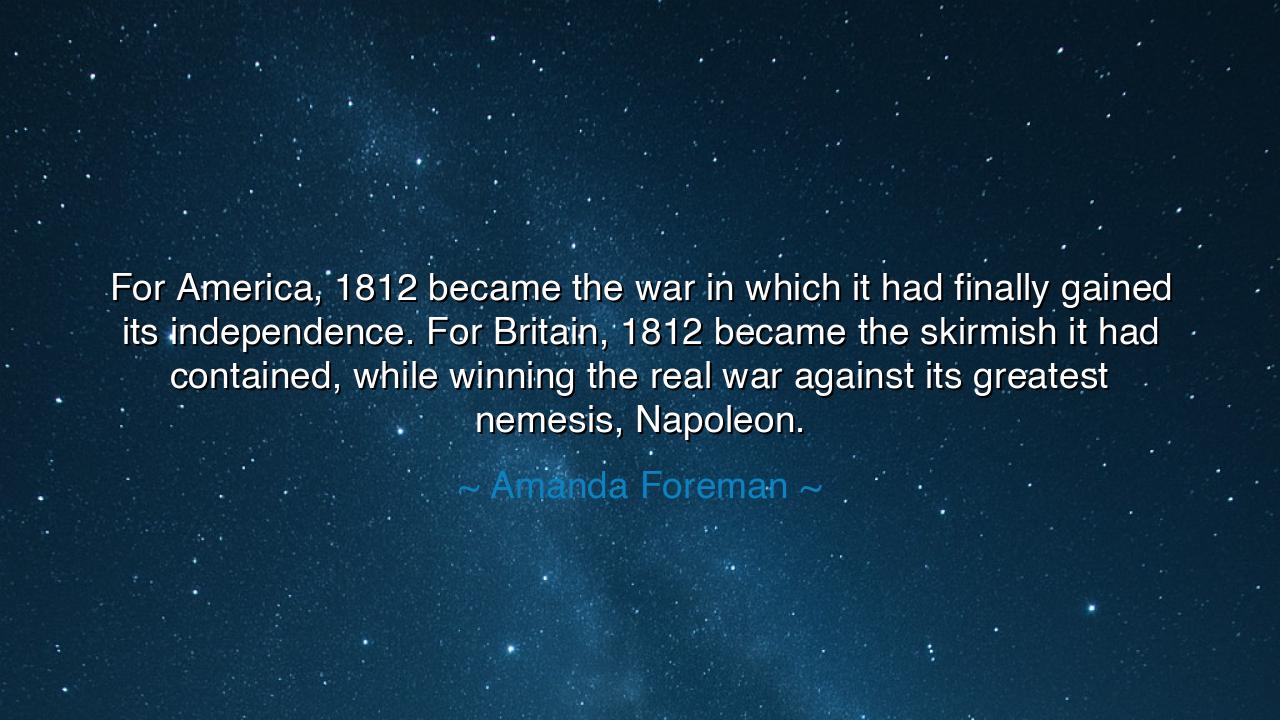
For America, 1812 became the war in which it had finally gained
For America, 1812 became the war in which it had finally gained its independence. For Britain, 1812 became the skirmish it had contained, while winning the real war against its greatest nemesis, Napoleon.






Listen, O children of the future, to the words of Amanda Foreman, a scholar whose insight into the past reveals the complexity and nuance of history. "For America, 1812 became the war in which it had finally gained its independence. For Britain, 1812 became the skirmish it had contained, while winning the real war against its greatest nemesis, Napoleon." These words speak of two nations, each interpreting the same event through different lenses, yet both shaping their destinies in profound ways. In this conflict, America found its freedom, while Britain found the culmination of a long struggle that had been consuming it for over a decade.
The ancient world, too, was marked by such moments of paradox and reflection. Consider the Roman Empire—its history was shaped by a continuous series of wars, some seen as victories and others as burdens. The Battle of Actium, for example, was a final moment that marked not just the end of civil strife but the beginning of an empire's dominance. Yet, in the hearts of many in the Roman world, the rise of Augustus was more than a political consolidation; it was the fulfillment of a promise made to the people of Rome—to give them strength, order, and a united destiny. In the same way, the War of 1812 marked not just a political struggle for one country, but the turning point of a nation’s spirit—the moment when the world saw America as truly independent, not just by declaration but by action.
In the case of America and the War of 1812, it was a battle for recognition. America, in many ways, had already won its independence in 1783, but the lingering doubts of the world, particularly Britain, still lingered. The British Empire had fought fiercely during the Revolutionary War and signed a treaty that formally recognized America’s independence, yet it continued to interfere with American trade, impressing American sailors into service for the Royal Navy, and generally disregarding American sovereignty. It was the War of 1812, a conflict born of these tensions, that truly proved America’s independence. It was no longer a question of whether America could stand as a free nation, but whether it could defend that freedom against an empire that had once sought to dominate it.
For Britain, however, the War of 1812 was not the pivotal struggle. At the time, Britain was deeply embroiled in the larger conflict with Napoleon Bonaparte, whose conquests across Europe had shaken the very foundations of the continent. The Napoleonic Wars were consuming Britain's attention, and the War of 1812 was seen by many British leaders as a mere distraction, a nuisance to be handled while their eyes were firmly fixed on the great Napoleonic menace. Britain had to manage the rising tides of American resistance, but it saw the ultimate victory in the defeat of Napoleon, whose ambitions threatened all of Europe. It was only after Napoleon’s exile and the conclusion of the Napoleonic Wars that Britain could turn its attention fully to the peace with America, acknowledging that while it had contained the skirmish in the colonies, the real prize lay in the broader European conflict.
The War of 1812 thus became a defining moment for America’s sense of identity and independence. The Battle of New Orleans, fought after the treaty had already been signed, became a symbol of American resilience and a rallying point for the new nation. Andrew Jackson, who led the American forces to victory, became a national hero, embodying the spirit of a nation that had risen from the ashes of colonial rule to claim its place on the world stage. The treaty that ended the war did not result in any significant territorial changes, but it solidified the idea that America was not just a rebellious colony, but a sovereign nation that had earned its place among the great powers of the world.
The lesson, O children, is that independence is not merely the signing of a treaty or the end of a conflict. It is the realization that true sovereignty comes not only from the recognition of your rights but from the courage to defend them, even when the world doubts you. America’s independence was solidified not just by the victory in battle but by its continued resolve to stand on its own, to face its adversaries, and to prove its strength. It is a reminder that the journey to freedom is not linear; it is filled with setbacks, challenges, and moments of uncertainty. Yet, it is the will to endure, to rise from adversity, and to claim what is rightfully yours that defines the path of freedom.
So, O children, take this wisdom into your own lives. Understand that freedom is a prize that must be defended not just in the courts or the halls of government, but in the courage to face every challenge that comes your way. Recognize that there are moments in history—moments of struggle—that shape the very soul of a nation or an individual. Just as America found its true independence not just through the signing of treaties but through the blood, sweat, and resolve of its people, so too must you stand firm in your own path toward freedom, no matter the struggles you face. Stand strong, for the war for independence—whether personal or collective—is never truly over. It is in every act of resilience and courage that we claim the future we seek.






AAdministratorAdministrator
Welcome, honored guests. Please leave a comment, we will respond soon